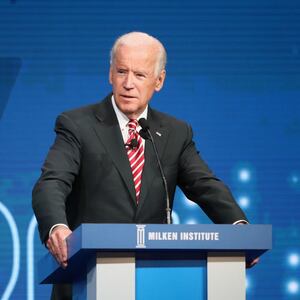At just 21 years old, C.J. Pearson boasts a lengthy record in the public arena. After going viral as a preteen for his self-taped takedown of Barack Obama, he has climbed the ranks of the right wing’s activist-pundit class, amassing hundreds of thousands of fans and a prominent perch at the conservative content platform PragerU.
Now, Pearson is hoping to add another line to his resume: Georgia state lawmaker.
The Augusta native is a candidate in a special primary election on Tuesday to fill a vacancy in a safely Republican state House district just outside his hometown. And even though he’s up against two other legitimate Republican contenders in the primary, Pearson is getting attention from huge platforms like Fox News—and characteristically projecting brash confidence.
“I couldn’t care less about race but in 10 days, the youngest black lawmaker in the country will be a MAGA Republican,” he has posted on X to his nearly 500,000 followers.
But there’s a particular aspect of Pearson’s history that he might prefer to avoid talking about—one that raises questions about his fitness for public office.
In the wake of riots over George Floyd’s murder in 2020, Pearson launched a GoFundMe page billed as a rescue effort for Black-owned businesses that had suffered damage in the unrest.
“This is an opportunity for conservatives to show the black community that we stand in support of them, capitalism, and the sacrifices they made to become entrepreneurs in the first place,” he wrote on the page.
The effort ended up raising roughly $170,000 in just a few days. Pearson said he would partner with a nonprofit, the Georgia Association of Minority Entrepreneurs, to distribute those funds as grants to needy businesses.
Nearly four years later, however, it remains unclear exactly how much of that money was actually directed to businesses that could have benefited from the funds, according to annual federal tax filings for the nonprofit.
What is clear is that only a small portion of the initial GoFundMe haul was put to use, leaving the nonprofit still sitting on most of the money it raised in 2020.
According to the nonprofit’s publicly accessible 990 tax forms—which list Pearson on the group’s board of directors—only $10,000 was granted to businesses in the six months after the riots.
In fact, it was just one business: an Atlanta beauty salon, whose owner was photographed accepting an oversized check from Pearson in a glowing article in the Atlanta Journal Constitution.
In 2021 and 2022, GAME reported giving out a combined $46,000 in grants. But unlike in 2020, the forms did not specify any recipients of the funds—making it impossible to know who received funds, or how much. Under Internal Revenue Service rules, nonprofits only have to disclose information for recipients of grants larger than $5,000, so it’s possible that the nonprofit gave out multiple small grants below the reporting threshold.
In its 2020 piece, the Journal Constitution reported that Pearson would have been happy to raise $30,000, “enough perhaps to help defray insurance deductibles for a few hundred.”
Pearson raised nearly six times what he hoped. But the nonprofit has claimed to direct only a third of the sum toward the purpose that had made the GoFundMe such a success. In 2023, with the recovery efforts from the unrest of 2020 far in the rearview for most businesses, the nonprofit reported sitting on $146,000 in unused cash.
A spokesman for Pearson’s campaign did not respond to emailed questions from The Daily Beast about the GoFundMe effort. The chairman and treasurer for the nonprofit also did not provide comment.
While Pearson is best known for his wunderkind background and bombastic, right-wing commentary, his handling of the GoFundMe campaign represents a rare glimpse at what the young firebrand does when he has the power to wield resources and make important decisions.
If the episode is any indication of how Pearson might behave as a member of the Georgia legislature, it may be one of the most important lines in his résumé for voters to consider.
There are other questionable decisions, of course. In recent years, Pearson has made a sport out of antagonizing powerful Georgia Republicans whom he deems insufficiently radical. Chief among his targets has been Gov. Brian Kemp, who made many enemies in the GOP base for not reversing Trump’s defeat in Georgia in 2020.
Pearson was one of those enemies. In November 2020, he joined a lawsuit filed against Kemp—with “Kraken” lawyer Sidney Powell—to overturn Joe Biden’s victory in Georgia. Ahead of the 2022 midterm elections, Pearson also managed the gubernatorial campaign of Vernon Jones, the blustering state representative who mounted a MAGA-tinged challenge to Kemp.
But the Georgia governor got the last word. Jones’ campaign was short-lived, and the candidate he endorsed, former Sen. David Perdue, was embarrassed by Kemp in the primary.
The young MAGA influencer embraces the idea that he would be a rabble rouser in the state capitol if he were elected. But Pearson’s philanthropic efforts from 2020 might show a different side to his activism—on paper, at least.
By the time he launched the GoFundMe for Black-owned businesses in June 2020, Pearson was already a well-known conservative commentator with a big platform—a platform he would tap to raise money for those he said were harmed by “ANTIFA” violence.
“Over the course of the next few days, I will be working to identify black owned businesses—throughout the country—that suffered damages due to recent events of rioting and looting in their city,” he wrote at the time. “These funds will be used to offset the cost of damages, renovations, and loss of business.”
On his GoFundMe page, Pearson wrote he would be “partnering with the Georgia Association of Minority Entrepreneurs - a registered 501c(3) non-profit organization - to do this.”
After the fundraising campaign’s success in June, Pearson got that glowing write-up in the Journal Constitution, complete with the photo of him handing the oversized $10,000 check to Atlanta clothing boutique Wilbourn Sisters Designs.
In the piece—headlined “How this teen got in the GAME to help save black businesses”—Journal Constitution columnist Gracie Bonds Staples spoke to Pearson about his rationale for starting the effort.
“It just hit close to home literally and figuratively,” Pearson told the paper. “I live just two hours from Atlanta. I recognized a lot of the places that had been torched, that had been vandalized.”
After raising the money, Pearson said he chose Wilbourn Sisters Designs as their first grant recipient after the damage to their store was covered on the news. “In the midst of the mayhem, Wilbourn caught the attention of news outlets. Pearson saw her story. He wanted to help and he did,” the column read.
“For Pearson, the GoFundMe campaign is just a first step, but it’s the first step in the right direction,” the story concluded.
But the real story wasn’t over.
The tax forms for GAME reveal that even the GoFundMe was barely a step at all in terms of making the impact Pearson said he would have.
According to the organization’s 2020 tax form, GAME reported $174,500 in revenue, nearly all of which presumably came from the digital fundraising effort.
By the end of the year—six months after riots swept through Atlanta and other major cities—the organization was supposedly sitting on more than $182,000 and had appeared to help only one business.
The annual tax forms for the organization from 2021, 2022, and 2023 only deepen the questions over how the money Pearson raised was used—or, more accurately, not used.
The records show GAME continued sitting on the vast majority of the funds raised in 2020, while giving out comparatively little in grants.
On its 2021 tax form, GAME claimed it gave out just $6,000 in grants to unspecified recipients. On its 2022 form, it said it gave out $41,000 to unspecified recipients. And in 2023, it claimed it gave out zero grant money, but reported having over $146,000 in the bank.
While GAME raised small amounts each year after 2020—such as $20,000 in 2022—it’s clear the huge sum it raised to help victims of property damage has sat largely unused four years later, long after most businesses would have needed those funds to recover.
GAME did report other expenses, but they were vague. In 2021, for instance, it reported spending nearly $30,000 on “marketing and PR,” but did not list who was paid for the work. In 2023, it spent over $10,000 on marketing and PR.
Before Pearson’s GoFundMe, GAME appeared to be a quiet organization with a small footprint. In 2019, it reported raising $20,000, spending $12,400, and ending the year with just over $14,000 in the bank. Pearson was not listed as a member of the board of directors before 2020.
In the years 2017 through 2019, the nonprofit gave no grants, nor did it spend a dollar on anything like marketing or PR. Its largest expenses were earmarked as “business development” or “business networking.” In 2016, the group did spend about $1,000 on marketing.
The group’s website currently lists an outdated phone number and still prominently displays a link where businesses can apply for the fund Pearson established.
On his GoFundMe page, Pearson also falsely claimed GAME was a 501c(3) nonprofit organization, but it’s actually a 501c(6) organization.
While that may seem like a pedantic distinction, there’s actually an important difference: nonprofits organized in the c(3) category are typically charitable in purpose, while those in the c(6) category are commerce-oriented. A c(6) is often organized to represent an aligned set of businesses or trade groups. The American Medical Association, for instance, is a c(6), as are many professional sports leagues and chambers of commerce.
As such, contributions to c(3) organizations are tax-deductible, while contributions to c(6) organizations are not.
The 2020 GoFundMe for Black businesses was not Pearson’s first or only digital fundraising effort. Since 2017, he appears to have launched at least four others—two to benefit families of classmates who had died, and two to fuel his own political career.
In 2018, Pearson raised $10,325 by asking conservatives to help him counter messaging from the young survivors of the Parkland, Florida, mass shooting.
“Liberal teens like David Hogg and Cameron Kasky might have Hollywood CNN [sic], and George Soros on their side but the truth and hundreds of thousands of freedom loving Americans are on mine,” he said. “Any support you might be able to offer would be greatly appreciated!”
In December 2020, Pearson once again turned to GoFundMe, only this fundraiser was far less successful. Titled, “I’m Tired Of Schools Teaching Kids To Hate America,” the page solicited cash for Pearson to write a book that would “tell kids my age the TRUTH about America.” The funds, he said, would be “used for expenses and costs related to the publication of this book and to offset expenses related to university/school related speaking engagement.”
Pearson raised $2,852—far short of his $10,000 goal—but he never ended up writing the book.









